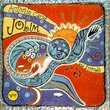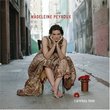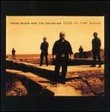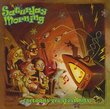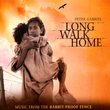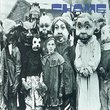| All Artists: Dave Douglas Title: Strange Liberation Members Wishing: 1 Total Copies: 0 Label: RCA Original Release Date: 1/1/2000 Re-Release Date: 1/27/2004 Genres: Jazz, Special Interest, Pop Style: Avant Garde & Free Jazz Number of Discs: 1 SwapaCD Credits: 1 Other Editions: Strange Liberation UPC: 828765081825 |
Search - Dave Douglas :: Strange Liberation
 | Dave Douglas Strange Liberation Genres: Jazz, Special Interest, Pop
He may deny it, but trumpeter Dave Douglas is straight out of Miles Davis. Nothing aurally illustrates that influence more clearly than this small-combo recording with Uri Caine on Fender Rhodes piano, drummer Clarence Pen... more » |
CD DetailsSynopsis
Amazon.com He may deny it, but trumpeter Dave Douglas is straight out of Miles Davis. Nothing aurally illustrates that influence more clearly than this small-combo recording with Uri Caine on Fender Rhodes piano, drummer Clarence Penn, bassist James Genus, and bass clarinetist-saxophonist Chris Potter. Douglas has recorded a number of ambitious projects over the years--from Middle-Eastern-inspired compositions to hip-hop-oriented works--but in this tried-and-true format, he extends and elaborates on the mid-'60s sounds of Davis's Miles in the Sky and Filles de Kilimanjaro. Like that of the Prince of Darkness, Douglas's trumpet beams with the same bravura, backed by Caine's Herbie Hancock-style keyboard, Penn's moody and martial drumming, and Genus's rock-steady bass on the uptempo "Seventeen," the Wayne Shorter-like title track, and the bluesy "Rock of Billy." Throw the twilight-toned twang of Bill Frisell's guitar into this mix, and you've got a CD that shows how to deftly blend the electric with the acoustic, resulting in a fusion that declares it roots and points the way to the future. --Eugene Holley, Jr. Similarly Requested CDs
|
CD ReviewsHomage to Miles M. Neustadt | Baltimore, MD United States | 02/20/2004 (4 out of 5 stars) "I'm writing this review because I've noticed that there are a few total Dave Douglas junkies who post on Amazon who are, in my view, a little hyperbolic. If I were browsing for an CD to try, I'm not sure I would find the rave reviews totally helpful. I myself can't say I'm a Dave Douglas fanatic, although I enjoy his CD's very much. For me, the most striking thing about this new album is that it so directly mimics Miles Davis' sound from the Miles Smiles or Miles in the Sky era. As a longtime jazz listener, I'd say it's not that common to hear one serious artist so overtly pay homage to another. But I swear, if you close your eyes there are moments when you think you're listening to Wayne Shorter, Tony Williams, Miles et. al. And, of course, Bill Frisell, only adds to the illusion. Curiously, this is the second album in a row where Dave Douglas has paid homage to a specific era of Miles' music - the last one sounding almost dead-on like On the Corner or Live at the Filmore (if you have checked out Freak-In, and liked fusion jazz from the 70s, you should definitely get it. It's been in my CD changer continuously for almost a year).I wouldn't give the album five stars in part because it is derivative. On my favorite Dave Douglas work, he's working with a more original sound. But the playing is absolutely wonderful. The tracks are varied. They swing beautifully. If you like that Miles sound from the late 60s you should definitely pick this up. If you don't own Miles Smiles and Nefretiti, you should buy them first since they are canonical, as Dave Douglas clearly agrees." Dave in Miles mode bimwa | Australia | 04/28/2004 (3 out of 5 stars) "I've got to admit, I'm a little puzzled by the direction Dave Douglas has been moving in lately. I originally got into his playing through John Zorn's Masada, and his own highly original groups Tiny Bell Trio and Charms Of The Night Sky. It is noteworthy that in the liner notes to the 2000 album 'A Thousand Evenings' by the latter band Douglas wrote about the futility of reliving Miles classics such as 'Birth Of The Cool', 'Kind Of Blue' and 'Filles de Kilimanjaro'.And yet here, just a few years later we see him very much in Miles mode, in not just this album but also the previous two ('Freak In' and 'The Infinite'). Now of course there's no denying that this album is good, the tunes are good, the players are all amazing, but it's just so *safe*. We know these guys can play the hell out of bop tunes - that's why we've been so thrilled to hear Douglas mixing it up with Balkan rhythms, or accordion and violin, or pianist Uri Caine arranging music by Mahler and Bach.So anyway, on to special guest Bill Frisell... the prospect of these guys (two of my favourite musicians) making an album together a few years ago would have been one of the most exciting things imaginable. Now, they seem to be settling down, making pretty pleasant music without the danger we once knew from them. Like I said before, the playing is still great and all, but just a bit predictable, not a lot of sparks there.It's not all *that* predictable though - for example they try out a 50s rock thing, which for my money doesn't really work. Apart from the awful name ('Rock Of Billy') it also just puts the vibe of the album out of whack for six minutes. The piece that follows, however, 'The Frisell Dream', is fantastic, one of my favourite Dave Douglas compositions in a long while. It is a little bit cluttered though, and I have to wonder, on this track as well as others, whether the six-piece band is so necessary (despite the players' obvious talents)." Dave Douglas reinvents himself again . . . Jan P. Dennis | Monument, CO USA | 02/09/2004 (5 out of 5 stars) ". . . and the results are pretty spectacular.First of all, he's now got himself a real band--at least that's what he says in the liner notes. And what a band it is! Chris Potter, fast emerging as THE tenor sax voice of his generation, is on board. If he's still a member of the Dave Holland Quintet, that means he regularly plays in just about the two hottest gigs around. In the past couple of years, his tone has deepened, his soloing has become at once more assured and adventurous, and his general presence more authoritative.Uri Caine has also emerged as a monster keys man. Playing Fender Rhodes exclusively on this outing--which will likely make purists moan in despair (but so what)--he manages to create exactly the right vibe and colors for this thoroughly contemporary electric jazz set. Moreover, he manages to get quite a wide range of expression from an instrument not known for its tonal and timbral versatility. I've always thought James Genus was underrated. A player equally at home on acoustic or electric bass, he gets a weighty tone from his acoustic and creates a very funky feel on electric, perfectly a propos in this setting which straddles tradition and innovation. Clarence Penn is an inspired choice for the drum chair. A player of both subtlety and power, he constantly sets a tasty table for the front liners. Douglas's playing on this outing is the best I've ever heard from him. He sports a darker tone with a new-found gravitas. Yes, he can still be very declamatory and expressive, but he seems more interested in shaping a unique sound signature and finding his proper place in it than in showing off his not inconsiderable chops, a welcome development for one as gifted as he is. And his soloing seems to have a new architectural sense that notches his playing up to a new level.The ringer here is guest Bill Frisell on guitar. After listening to him and the leader play together, creating a soundscape so natural as to sound almost inevitable, one wonders why they'd never played together before, and one also imagines what this band could become were he a permanent member. Indeed, his Heartland jazz aesthetic is all over this disc (esp., "Mountains from the Train," featuring some very cool and atmospheric harmonics and other guitar effects. One of the most poignant moments is a tender passage in "Just Say This," where Frisell magically comps behind a muted trumpet solo of both great power and delicacy from Douglas. Potter's solo which follows is also among his best on disc, and Frisell tops things off with an absolutely stunningly beautiful twangy solo.This band has the capability of a huge range of emotional statement, with its general MO being a highly charged approach situated in a slightly eerie Americana vibe obviously largely a result of Mr. Frisell being on board. But there's also a faux-50's number, "Rock of Billy"; a turbo-charged bop-samba, "Seventeen"; a Monkish tune, "Skeeter-ism," whose genesis, according to the liner notes, came from an eight-year-old friend of Douglas's trying to play "Blue Monk"; a wacky waltz, "The Frisell Dream," featuring some gorgeous ensemble playing; a nifty piece of impressionism, "Passing Through"; a sprightly ballad that morphs into a Latin-feeling number featuring probably the finest Fender Rhodes solo on record plus nearly topped by a marvelous solo from Potter; and a rocking, rollicking Nu Bop tune, "Catalyst," magically propelled by Clarence Penn, that eventually works itself up into a near freak-out, largely powered by a mind-boggling solo from Frisell, with Potter upping the ante on his brilliantly expressive solo, until the entire band just kinda blows everything out of the water, fading out to some Frisell weirdness. Quite a send-off.All in all, this is a tremendous disc, even topping, I think Freak-In, which I didn't think possible. A powerful, endearing musical statement that should appeal to all with open ears."
|

 Track Listings (11) - Disc #1
Track Listings (11) - Disc #1